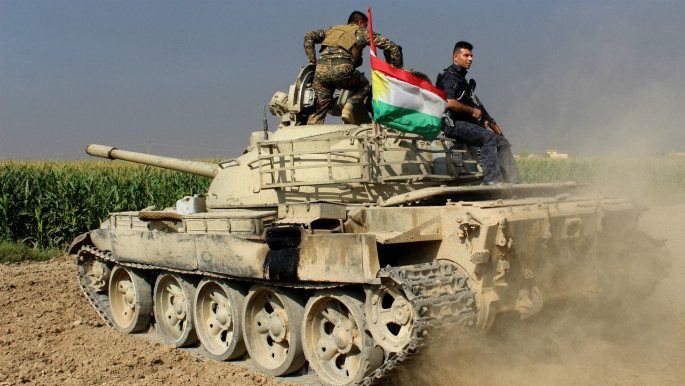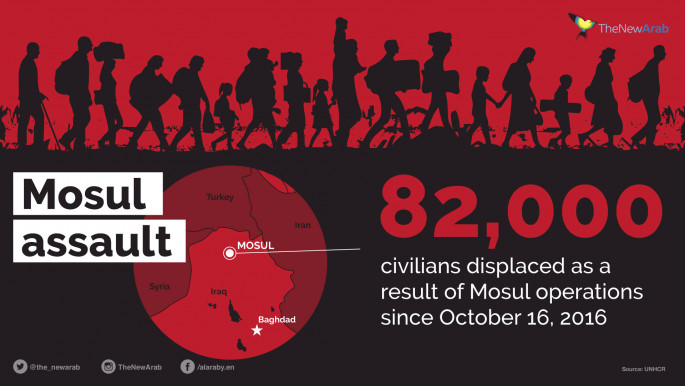Kurds' destruction of Iraqi villages a 'war crime'
Iraq's autonomous Kurdish region has gained or solidified control over swathes of territory claimed by both it and the federal government in Baghdad in the course of the war against the Islamic State [IS] group.
While the Iraqi federal and Kurdish regional governments are both fighting IS, there are long-running disputes between them over territory and resources, as well as Kurdish mistrust of Baghdad and the country's Arab majority rooted in Saddam Hussein's brutal treatment of their community.
Human Rights Watch found "a pattern of apparently unlawful demolitions of buildings and homes, and in many cases entire villages, between September 2014 and May 2016," it said in a report.
The destruction occurred "in 17 villages and towns in Kirkuk and four in Nineveh governorate," HRW said, adding that it was carried out "by fire, heavy equipment and explosives."
Satellite imagery provided evidence of destruction in another 62 villages after Kurdish forces recaptured them, but HRW said the lack of available witness testimony precluded "definitive conclusions" in those cases.
IS overran swathes of territory in Nineveh and Kirkuk and other provinces in June 2014.
But Iraqi federal and Kurdish forces have since regained most of the areas, and the northern city of Mosul is now the last held by IS in the country.
 |
|
HRW accuses Kurdish forces of unlawfully destroying Arab homes in their fight against IS [Anadolu] |
Disputes over territorial control
Who controls that territory will be a major source of contention going forward, with the Kurds saying they aim to keep areas they retook, while the federal government has long insisted that disputed areas belong to Baghdad.
HRW said it had presented its findings to the Kurdistan Regional Government [KRG], which announced an investigation and responded to some but not all allegations.
Kurdish authorities claimed that much of the destruction was caused by US-led airstrikes as well as artillery fire, while some buildings were said to have been blown up to deal with bombs planted by IS.
HRW said that areas could have been cordoned off for later clearance, and that blowing up the houses could scatter explosives over the area, making it more dangerous.
 |
And it noted that Kurdish forces had destroyed buildings in places that IS had never captured, making it unlikely they would have been rigged with bombs by the militants.
"In village after village in Kirkuk and Ninevah, KRG security forces destroyed Arab homes – but not those belonging to Kurds – for no legitimate military purpose," said Joe Stork, deputy Middle East director at Human Rights Watch.
"KRG leaders' political goals don't justify demolishing homes illegally."
Sunni Arab politicians have previously accused the Kurds of seeking to recast the demographics of mixed areas in northern Iraq. The struggle is particularly intense in the oil-rich Kirkuk region.
HRW said that Kurdish leader Massoud Barzani said he does not intend to allow Arab residents to return to areas where they settled under Saddam's efforts to change the demographics of Kurdish areas of the country.
Barzani told HRW in June that Kurdistan "would not allow Sunni Arabs to return to villages that had been 'Arabised' by former President Saddam Hussein. He said these were, in his view, rightfully Kurdish lands," the report said.
"Such territorial claims lend credence to the belief of many Arabs that KRG security forces may have carried out demolitions for the purpose of preventing or dissuading Arabs from returning there," HRW said.
All sides fighting in the battle for Mosul have been accused of human rights abuses, with the worst allegations focusing on IS.
Last year, Amnesty International accused Kurdish forces of destroying Arab homes, alleging in its report that the Peshmerga carried out the attacks in retaliation for what they said was the Arab communities' support for IS.
Agencies contributed to this report





 Follow the Middle East's top stories in English at The New Arab on Google News
Follow the Middle East's top stories in English at The New Arab on Google News


